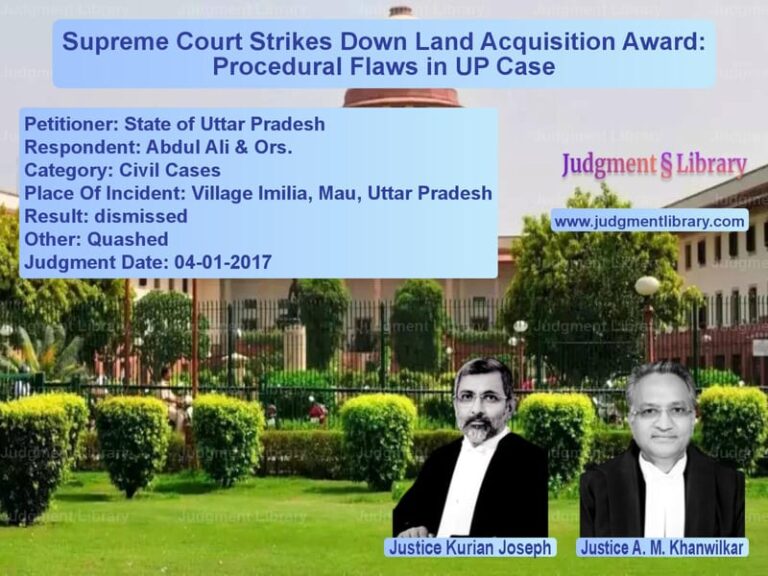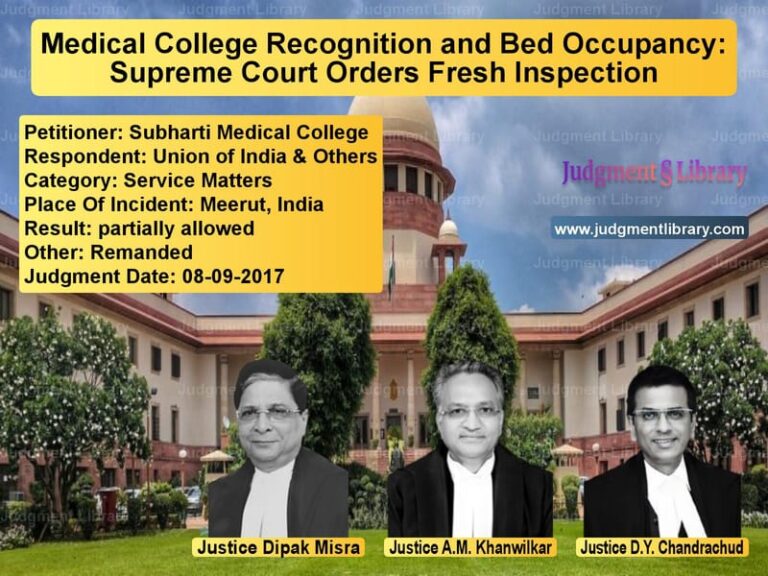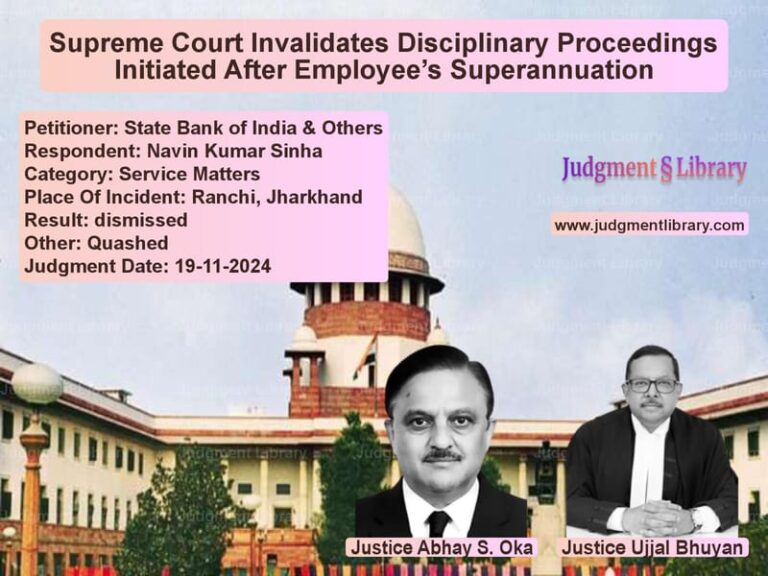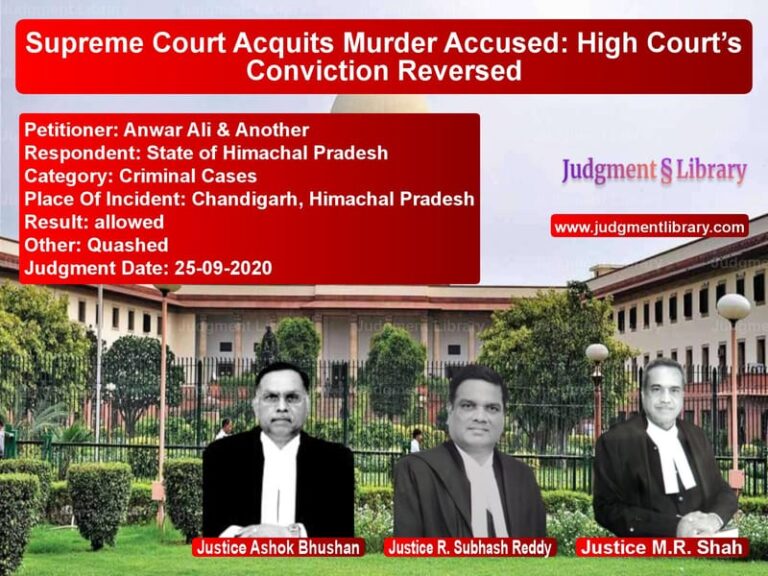Supreme Court Holds Promoters Guilty in Contempt Case Over Arbitration Award
The Supreme Court of India delivered a crucial verdict in the case of Vinay Prakash Singh v. Sameer Gehlaut & Ors. on November 15, 2019. This case revolved around the enforcement of an international arbitration award and the alleged contempt of court committed by various respondents, including prominent business figures Malvinder Mohan Singh and Shivinder Mohan Singh.
Background of the Case
The dispute originated when Daiichi Sankyo Company Limited initiated arbitration proceedings against the respondents, seeking damages for fraudulent misrepresentations made during the sale of shares in Ranbaxy Laboratories Limited. The Singapore-seated arbitration tribunal awarded Daiichi Sankyo approximately Rs. 3,500 crores on April 29, 2016.
The respondents challenged the award in Singapore and India. However, the objections were dismissed, making the award enforceable. The petitioner, seeking enforcement of the award, approached the Delhi High Court. The respondents opposed enforcement, citing various legal objections, but the High Court dismissed these objections except for those concerning minor respondents.
Key Issues
- Whether the respondents engaged in deliberate acts to frustrate the enforcement of the arbitration award.
- Whether the respondents violated multiple court orders restraining them from transferring or encumbering assets.
- Whether the respondents’ actions constituted contempt of court.
Petitioner’s Arguments
- The petitioner argued that the respondents systematically transferred assets to defeat the enforcement of the award.
- The respondents repeatedly assured the Delhi High Court that they would not alienate assets but later violated these assurances.
- Despite orders from both the High Court and the Supreme Court, the respondents engaged in fraudulent transactions to reduce their shareholding in Fortis Healthcare Limited (FHL).
- Massive transfers of funds and shares were made to foreign entities, further indicating an intent to obstruct justice.
Respondents’ Arguments
- The respondents contended that they did not willfully disobey any court orders.
- They claimed that financial obligations required them to encumber shares and transfer funds.
- They argued that transactions were undertaken in good faith to satisfy creditors and that they had no intention of frustrating the award.
- They denied direct involvement in the alleged fraudulent transactions, blaming third parties and market forces for the dilution of their assets.
Supreme Court’s Observations
The Supreme Court meticulously analyzed the evidence and concluded that the respondents had engaged in a deliberate scheme to defeat the enforcement of the arbitration award. The key findings of the Court included:
- Repeated assurances given by the respondents to the Delhi High Court were false and made with the intent to mislead the Court.
- The respondents systematically transferred unencumbered shares of Fortis Healthcare Limited (FHL), despite multiple court orders restraining them from doing so.
- Large sums of money were transferred to foreign trusts, further indicating a willful attempt to frustrate the enforcement of the award.
- The transactions were executed in a clandestine and deceitful manner, reinforcing the finding of contempt.
Final Judgment
The Supreme Court found the respondents guilty of contempt and directed them to deposit substantial sums to purge themselves of contempt:
- Malvinder Mohan Singh and Shivinder Mohan Singh were directed to deposit Rs. 1,170.95 crores each within eight weeks.
- Several directors of Indiabulls Housing Finance Limited and Indiabulls Ventures Limited were also held guilty and directed to purge their contempt by depositing the value of 12,25,000 shares.
- The Court issued a suo motu contempt notice against RHC Holding Private Limited, Oscar Investments Limited, Fortis Healthcare Limited, and the Singh brothers for alleged violations of another Supreme Court order dated December 14, 2018.
Impact of the Judgment
The ruling sends a strong message about the importance of honoring court orders, especially in arbitration enforcement cases. The key takeaways from this judgment are:
- Business promoters cannot evade legal obligations by transferring assets in a fraudulent manner.
- The courts will not hesitate to invoke contempt powers to ensure compliance with arbitration awards.
- The judgment reinforces India’s commitment to enforcing international arbitration awards, boosting investor confidence.
Conclusion
The Supreme Court’s decision in Vinay Prakash Singh v. Sameer Gehlaut & Ors. marks a significant milestone in Indian arbitration enforcement jurisprudence. It upholds the rule of law by ensuring that arbitration awards are not rendered meaningless through fraudulent asset transfers. This ruling will serve as a deterrent to those who attempt to evade legal liabilities through deceitful means.
Petitioner Name: Vinay Prakash Singh.Respondent Name: Sameer Gehlaut & Ors..Judgment By: Justice Ranjan Gogoi, Justice Deepak Gupta, Justice Sanjiv Khanna.Place Of Incident: India.Judgment Date: 15-11-2019.
Don’t miss out on the full details! Download the complete judgment in PDF format below and gain valuable insights instantly!
Download Judgment: Vinay Prakash Singh vs Sameer Gehlaut & Ors Supreme Court of India Judgment Dated 15-11-2019.pdf
Direct Downlaod Judgment: Direct downlaod this Judgment
See all petitions in Arbitration Awards
See all petitions in Dispute Resolution Mechanisms
See all petitions in Enforcement of Awards
See all petitions in Judgment by Ranjan Gogoi
See all petitions in Judgment by Deepak Gupta
See all petitions in Judgment by Sanjiv Khanna
See all petitions in allowed
See all petitions in Quashed
See all petitions in supreme court of India judgments November 2019
See all petitions in 2019 judgments
See all posts in Arbitration and Alternate Dispute Resolution Category
See all allowed petitions in Arbitration and Alternate Dispute Resolution Category
See all Dismissed petitions in Arbitration and Alternate Dispute Resolution Category
See all partially allowed petitions in Arbitration and Alternate Dispute Resolution Category







